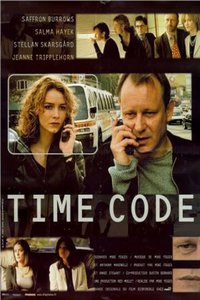Timecode (2000)

Timecode is not your average film. For those who don't know, Director Figgis took around 25-30 actors, gave them a loose idea of the themes and plot strands he wanted in Timecode (originally called Timecode 2000) and then shot 15 versions of the film, each in four continuous takes running concurrently. And the script was improvised every time. The actors were responsible for their own lines, hair, make-up, whatever. And every day, he asked the actors to change the subtleties of their performance, resulting in a different ending each time. This version is number 15.
Relying on split-screen (that much-maligned 1970s staple), there are actually four intersecting films here. Figgis starts with Tripplehorn, Skarsgard (pictured), Burrows and Halmek in four corners of the screen and then follows where they lead. Like Richard Linklater's Slacker, the action does not necessarily stick with the original four, slipping off to follow other characters that cross their path, but we make it back to them in the end.
The film centres around a small movie production company, owned and founded by Skarsgard, who is starting to crack under the strain of a crumbling personal life and equally fractious business life. All the cast pass through the office at some point, whether they are being considered for the latest exploitation flick the company is producing (Hayek as Rose, an actress having an affair with Skarsgard) or just taking a meeting (Hunter's cynical executive).
With four different perspectives on display at any one time, there are obviously four soundtracks competing for your attention, but one is always faded up higher than the others. This has the effect of guiding you to the prominent story. It is not always a satisfactory system; personally, I would have preferred that Burrows' story was faded down for the majority of her time as it throws the least light on the other strands.
Figgis has assembled a fine cast but everyone's performance is blown away by the intensity of Tripplehorn, as Hayek's rich, neurotic, drug-addled lover. She's a seething mass of self-righteous jealousy and rage and, when the camera is not focusing on her storyline, you feel cheated.
Generally speaking, the improvisation works well, but only the Tripplehorn story arc is strong enough to sustain the full running time. Towards the end, some of the other strands of the film are floundering, which detracts from what could have been a fully satisfying rather than just technically intriguing film.